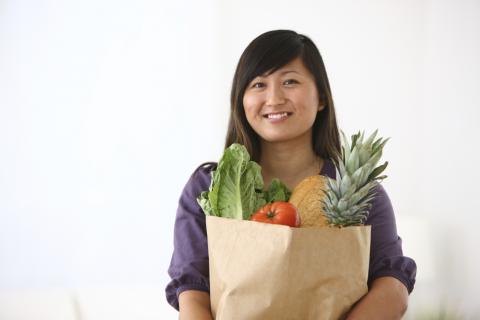5 Tips for Feeding Your Family Through Quarantine: Tip #3 Bring Food Home Safely

The current recommendation is to spend as little time as possible in public places. To keep the shopping trip short, it’s best to make a list ahead of time and stick to it while in the store. If you are pantry planning, you can plan to stock your shelves with the essentials that last a while. While shopping, you may find that items on your list are not available, so it’s a good idea to know how to make substitutions. Here are some things to keep in mind:
Eggs – No eggs? You can buy pre-beaten eggs in a carton in the egg section or you can find egg replacer in the baking section, which would be good for baking.
Milk – To stock your pantry, you can buy evaporated, powdered or shelf-stable milk. Another substitute for milk would be almond, soy or rice milk, which can be shelf-stable and perfect for when you run out of fresh cow’s milk.
Baking supplies – It is helpful to keep baking supplies on hand so remember to look for flour, baking soda, baking powder, yeast and sugar. If there is no baking powder, you can make your own by mixing baking soda and cream of tartar or lemon juice.
Substitutions – You might want to know what substitutions to use when you run out of ingredients or cannot find them in the store. Items such as applesauce, avocado, bananas and yogurt are perfect for times like these and can be frozen for just the moment you need them.
Bringing food home:
Many people are concerned about how to bring food home safely from the grocery store. Although there is some misinformation going around about the outside of packages being contaminated, the FDA states that there is no evidence to show that COVID-19 is transmitted this way. Washing your hands is the key to preventing the spread of all germs.
When you come home from the grocery store and have brought the bags inside, wash your hands before doing anything else. Place your bags on one table and empty the items onto another clean surface to prevent cross contamination. Once you empty your bags you can wash your hands and the surface that held the bags before putting everything away. After everything is put away you can wash your hands again.
Washing Produce:
Some people are worried that COVID-19 might be spread through fresh produce, but at this time there is no evidence to show that it is transmitted this way. Fresh fruits and vegetables should NOT be washed with soap or bleach because these chemicals are not made for consumption. All produce must be washed before eating even if you do not eat the skin such as bananas, oranges and melons. To clean produce with a soft skin (like apples and grapes), rub briskly with your hands under cold running water. To wash produce with a tough outer skin (like carrots and potatoes), you can scrub with a vegetable brush wile rinsing under cold running water. You can sanitize the vegetable brush in a sanitizing solution after use and let it air dry if you want to keep it clean.
Preparing food safely:
When preparing food, it’s best to follow the same food safety practices that are recommended to prevent foodborne illness: Clean, Separate, Cook and Chill.
Clean: Wash your hands, surfaces and produce before preparing meals and eating.
Separate: Separate raw meat and produce when preparing food, and use different cutting boards for each.
Cook: Cook all food to the proper temperature to ensure that you will kill the bacteria that cause foodborne illness.
Chill: Cooked food must be refrigerated within two hours. Cold food must be stored in the refrigerator immediately after coming home from the store or after use.
By following these steps you can be assured that your pantry will be well stocked and ready for quarantine. Your food will be brought home safely, and ready to eat with no worries. Remember, the best way to stay healthy is to wash your hands and food.
For more from the 5 Tips for Feeding Your Family Through Quarantine series
Tip #2 Prevent the Spread While Shopping
Tip #4 When to Save or Throw Out Food
UNH Extension Pantry Planning https://extension.unh.edu/blog/5-tips-feeding-your-family-through-quarantine-tip-1-pantry-planning
Making baking powder https://www.johnson.k-state.edu/health-food-safety/agents-articles/3-key-chemical-leavening-agents-in-baking.html
Substitutions https://extension.usu.edu/archive/list-of-ingredient-substitutions-for-cooking-and-baking
FDA Food Safety https://www.fda.gov/consumers/consumer-updates/food-safety-and-availability-during-coronavirus-pandemic
Fight BAC https://www.fightbac.org/food-safety-basics/the-core-four-practices/
Fight BAC Cook to temperature https://www.fightbac.org/wp-content/uploads/2016/04/PFSE-7696-cooking-chart_FINAL.pdf
Fight BAC Washing produce https://www.fightbac.org/wp-content/uploads/2015/08/ConsumerFact_Sheet.pdf
Partnership for Food Safety Education washing produce https://www.youtube.com/watch?v=xh5TEjhFzHE&feature=youtu.be
